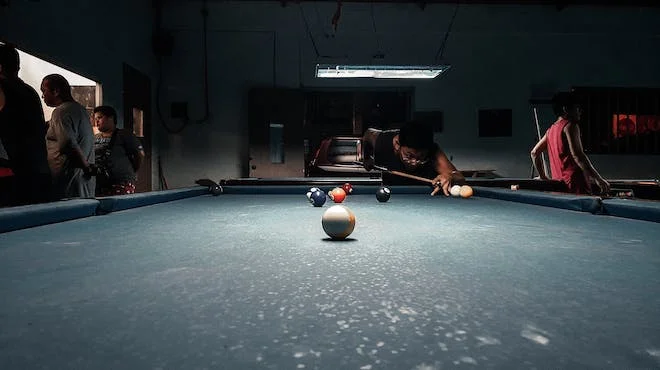
Have you ever wondered what it’s like to be a rebellious teenager in the 1950s? To skip school, play pool, drink gin, and live for the moment? To feel cool but also doomed. If so, you might want to read “We Real Cool” by Gwendolyn Brooks, one of the most influential and widely read American poets of the 20th century.
In this article, we’ll explore the poem’s subject, author, context, theme, tone, form, and structure, as well as analyze it line by line using various poetic devices. We’ll also summarize the poem’s main message and how it makes us feel. By the end of this post, you’ll have a deeper appreciation of this short but powerful poem and its relevance to our lives today.
We Real Cool Poem The Pool Players. Seven at the Golden Shovel. We real cool. We Left school. We Lurk late. We Strike straight. We Sing sin. We Thin gin. We Jazz June. We Die soon.
About Gwendolyn Brooks and the Poem
Gwendolyn Brooks was born on June 7, 1917, in Topeka, Kansas. Then she moved to Chicago, Illinois, when she was six weeks old. She grew up on the South Side of Chicago, where she witnessed the harsh realities of urban life for African Americans. She started writing poetry at an early age and published her first poem, “Eventide,” at 13. Subsequently, she received encouragement and guidance from prominent black writers, such as James Weldon Johnson and Langston Hughes. They advised her to study the modernist poetry of T.S. Eliot, Ezra Pound, and E.E. Cummings.
Brooks published her first collection of poems, A Street in Bronzeville, in 1945. It received critical acclaim for its realistic and compassionate portrayal of the black community. Her second collection, “Annie Allen”, won the Pulitzer Prize for Poetry in 1950. This achievement made her the first African American to receive the prestigious award.
Brooks continued to write and publish poetry throughout her life, experimenting with different forms and styles. Doing so, she tried addressing various social and political issues, such as racism, sexism, violence, poverty, and civil rights. She also mentored and supported many young poets, especially those from marginalized backgrounds. She became the poet laureate of Illinois in 1968 and the U.S. Poet Laureate in 1985.
She also received numerous honors and awards, such as the National Medal of Arts, the Robert Frost Medal, and the Lifetime Achievement Award from the National Endowment for the Arts. She died on December 3, 2000, in Chicago, leaving behind a legacy of inspiring and influential poetry.
The Context of We Real Cool by Gwendolyn Brooks: The 1950s
“We Real Cool” was published in 1959 in Brooks’ third collection of poems, The Bean Eaters. The poem reflects the social and cultural atmosphere of the 1950s. The United States experienced prosperity, consumerism, conformity, and conservatism during this time. However, not everyone enjoyed the benefits of the post-war boom, especially African Americans, who faced discrimination, segregation, and oppression in many aspects of their lives. The 1950s also saw the emergence of the Civil Rights Movement. This movement challenged the status quo and demanded equal rights and justice for black people.
The poem also captures the spirit of the youth culture of the 1950s, which was influenced by the rise of rock and roll, the popularity of movies and television, and the rebelliousness of the Beat Generation. Many young people sought to express their individuality, creativity, and freedom. This often stood in contrast to the mainstream values and expectations of their parents and society. Some of them engaged in risky or deviant behaviors, such as smoking, drinking, gambling, or dropping out of school.
The Subject of We Real Cool by Gwendolyn Brooks: The Pool Players
The poem’s subtitle is “The Pool Players. Seven at the Golden Shovel” sets the scene and introduces the main characters of the poem. The pool players are seven young men who hang out at a pool hall called the Golden Shovel, presumably located in a poor and dangerous neighborhood. Also the name of the pool hall suggests both the glamour and the grimness of their lives, as well as their inevitable fate. The poem is written from their perspective, as they boast about their lifestyle and attitude. Throughout the poem, the first-person plural pronoun “we” is used consistently.
The poem does not provide much detail about the pool players, such as their names, ages, appearances, or backgrounds. However, based on the context and clues in the poem, we can infer that they are African American, likely in their late teens or early twenties. Additionally, it suggests they have dropped out of school and lack prospects for the future. They are outsiders and outcasts who have rejected the norms and values of society and have created their own subculture and identity.

Themes in We Real Cool by Gwendolyn Brooks
The central theme of “We Real Cool” revolves around the conscience of the pool players, providing insights into their mindset and attitude. Brooks invites readers to contemplate the reasons behind their rebellious actions and the potential consequences they face. Let’s explore the primary themes presented in the poem.
Conscience
The poem delves into the pool players’ consciences, offering a glimpse into their thoughts and motivations. Through the repeated use of “we,” the characters introspectively reflect on their actions, questioning societal norms and their own morality.
The pool players initially take pride in their defiance. Ultimately, they succumb to self-apprehension, acknowledging the potential negative outcomes of their choices.
Social Conventions
“We Real Cool” challenges social conventions and explores the allure of deviating from accepted norms. The pool players’ actions, such as leaving school, lurking late at night, and indulging in sinful behavior, directly contradict societal expectations. By embracing a non-conformist lifestyle, they embody the modern ideals of passion and freedom while rejecting traditional values.
Identity and Role Conflicts
The poem highlights the conflict between the identities the pool players have chosen for themselves and those imposed upon them by society. Their actions reflect a desire to be accepted and recognized for their true selves, rather than conforming to societal expectations. This struggle for individuality and recognition represents the identity crisis faced by many young people in society.
Modernism
“We Real Cool” exemplifies the impact of modernism on society. Furthermore, the pool players’ rejection of education, decency, discipline, and other traditional virtues aligns with the ideals of modernism. These ideals prioritize individual freedom and self-expression. By breaking rules and pursuing pleasure, they challenge established social norms, ultimately shaping the evolving perspective of society.
Poetic Devices in “We Real Cool”
Gwendolyn Brooks skillfully employs various poetic devices to enhance the impact and meaning of “We Real Cool”. These devices add depth and richness to the poem, capturing the essence of the pool players’ rebellious spirit. Let’s explore some of the key poetic devices utilized.
Repetition
The repetition of the word “we” throughout the poem emphasizes the collective voice and introspection of the pool players. It underscores their unity, their shared perspective, and their ongoing self-reflection.
Enjambment
Brooks employs enjambment throughout the poem, allowing thoughts and ideas to flow seamlessly from one line to the next. This technique creates a sense of continuity and fluidity, reinforcing the rebellious attitudes and actions of the pool players.
Alliteration
The poem features instances of alliteration, where consonant sounds are repeated in close proximity. For example, the repeated sound of “s” in “Strike straight” and “Sing sin” adds a musical quality to the verse. This enhances the overall rhythm and impact.
Metaphor
The phrase “die soon” serves as a metaphor in the final line of the poem. It symbolizes not only the potential demise of the pool players but also the consequences of their reckless and self-destructive behavior.
Assonance
Assonance is employed in the poem through the repetition of vowel sounds. For instance, the repeated sounds of /e/ in “Seven at the Golden Shovel” and /i/ in “Sing sin” and “Strike Straight” create a harmonious and melodic effect.
Irony
A contrast or discrepancy between what is said and what is meant, or between what is expected and what happens, is irony. For example, “We real cool” can be taken. The truth is that the pool players are not really cool but rather foolish and doomed.
Symbolism
Symbolism is the use of an object, person, place, or idea to represent something else, usually with a deeper or abstract meaning, as seen in “The Golden Shovel.” Here, the pool hall symbolizes both the glamour and the grimness of the pool players’ lives, as well as their deaths.
The Form and Structure of the Poem: A Short and Simple Poem
Couplet: The poem is structured as a series of couplets, with each stanza containing two lines that work together to convey a specific message. This structure lends itself to a concise and impactful delivery of the pool players’ rebellious sentiments.
End Rhyme: Brooks employs end rhyme to create a melodious quality in the poem. For instance, the rhyme between “cool” and “school,” “sin” and “gin,” and “June” and “soon” adds a rhythmic flow, enhancing the overall musicality of the verse.
Free Verse: “We Real Cool” is written in free verse, which allows Brooks to forgo the constraints of traditional rhyme and meter. This freedom enables her to convey the pool players’ rebellious attitude in a raw and unfiltered manner.
Rhyme Scheme: The poem follows an ABAB rhyme scheme, with each couplet containing its own distinct rhyme. This structured rhyme scheme adds a sense of cohesion and rhythm to the poem, reinforcing the rebellious sentiments conveyed.
The Poem: We Real Cool
The poem “We Real Cool” consists of eight lines divided into four stanzas, each containing two couplets. With its concise structure and impactful language, the poem captures the essence of the rebellious pool players’ attitude. Now, let’s examine the poem line by line to gain a deeper understanding of its meaning.
Stanza-wise Summary of We Real Cool by Gwendolyn Brooks
In the first stanza, the poem introduces the pool players, referring to them as “The Pool Players” and highlighting their presence at the “Golden Shovel”. This name carries symbolic weight, representing both the allure of pleasure and the potential for self-destruction. The pool players themselves take over the narration in the subsequent stanzas.
The second stanza reveals their defiant attitude, with the repeated use of “we” emphasizing their self-perception as being “real cool”. They proudly proclaim their decision to leave school, defying societal expectations and embracing a non-conformist lifestyle.
The third stanza showcases their rebellious behavior, as they boast about lurking late at night and striking straight in their pool games. Their actions challenge societal norms and demonstrate their disregard for authority.
In the final stanza, the pool players acknowledge their indulgence in sinful behavior, singing about their vices and diluting their gin. They celebrate the freedom and thrill of breaking rules during the month of June, which symbolizes a season of holidays and liberation. However, they are aware that their actions lead to a dark fate, accepting that they will “Die soon.”
Line-by-line Analysis of We Real Cool by Gwendolyn Brooks
Now, let’s look at each line of the poem and see how the poet uses these devices and techniques to convey her message and create her effects.
Line 1: “We real cool. We”
The first line of the poem introduces the pool players and their attitude. They use the word “real” to modify the word “cool,” implying that they are not just cool, but very cool. They also use the slang expression “real cool,” which was popular among young people in the 1950s, to show their defiance and creativity. However, the word “real” also suggests that they are trying to convince themselves and others of their coolness, as if they are insecure or doubtful about it. The word “cool” also has a double meaning, as it can mean both stylish and attractive but also cold and distant.
The first line also establishes the poem’s rhyme and meter, as well as the use of enjambment and caesura. The word “we” rhymes with the word “cool,” creating a musical and catchy sound. Additionally, the line has two stressed syllables, “real” and “cool,” creating a consistent and simple rhythm.
The line also continues to the next line without a pause or punctuation, creating a sense of flow and continuity. However, a period after the word “cool” indicates a pause or break in the line, which adds a sense of contrast and disruption. The pause also draws attention to the word “we,” which ends the line and the sentence, creating a sense of emptiness and finality. This is evident throughout the poem.
Line 2: “Left school. We”
The second line of the poem reveals the first action that the pool players have taken to show their rebelliousness and coolness. They have left school or dropped out of school, implying that they have no interest in or respect for education or authority. Here, the abandonment of education is presented as a badge of honor. By leaving school, they reject societal norms and expectations. The repetition of “we” reinforces their unity in defiance.
The second line also follows the same rhyme and meter, as well as the use of enjambment and caesura as the first line. The word “we” rhymes with the word “school,” creating a musical and catchy sound. The line has two stressed syllables, “left” and “school,” creating a consistent and simple rhythm.
Line 3: “Lurk late. We”
The third line of the poem reveals the second action that the pool players have taken to show their rebelliousness and coolness. They lurk late or stay out late at night, implying that they have no fear or concern for the dangers or consequences that might await them.
They have chosen to embrace the darkness and the unknown rather than the safety and the familiar. Staying out late signifies their disregard for curfews and rules. They embrace the night, symbolizing their rejection of societal constraints. They have decided to live on the edge, without any limits or boundaries.
The third line also follows the same rhyme and meter, as well as the use of enjambment and caesura as in the previous lines. The word “we” rhymes with the word “late,” creating a musical and catchy sound. The line has two stressed syllables, “lurk” and “late,” creating a consistent and simple rhythm.
Line 4: “Strike straight. We”
The fourth line of the poem reveals the third action that the pool players have taken to show their rebelliousness and coolness. They strike straight or play pool well, implying that they have skill and talent in the game. They have chosen to excel and compete in the pool hall rather than in the classroom or the workplace. The players have also chosen to be honest and fair in the game rather than cheating or lying. They have decided to live by their own code of honor, without any rules or regulations.
The fourth line also follows the same rhyme and meter, as well as the use of enjambment and caesura as in the previous lines. The word “we” rhymes with the word “straight,” creating a musical and catchy sound. The line has two stressed syllables, “strike” and “straight,” creating a consistent and simple rhythm.
Line 5: “Sing sin. We”
The fifth line of the poem reveals the fourth action that the pool players have taken to show their rebelliousness and coolness. They sin or enjoy their vices, implying that they have pleasure and fun in their lives. Instead of repenting and regretting their sins, they have chosen to indulge and celebrate them. They have also chosen to mock and challenge the moral and religious values of society rather than respecting or following them. They have decided to live by their own standards of happiness, without any guilt or remorse.
The fifth line also follows the same rhyme and meter, as well as the use of enjambment and caesura as in the previous lines. The word “we” rhymes with the word “sin,” creating a musical and catchy sound. The line has two stressed syllables, “sing” and “sin,” creating a consistent and simple rhythm.
Line 6: “Thin gin. We”

The sixth line of the poem reveals the fifth action that the pool players have taken to show their rebelliousness and coolness. They drink gin or alcohol, implying that they have freedom and relaxation in their lives. Here, “thin gin” suggests the act of diluting gin, possibly to stretch their supply or make it last longer. The word “thin” could also carry connotations of weakening or diluting their resolve or sense of responsibility. They have also chosen to drink and get drunk rather than stay sober and alert. They have decided to live according to their own desires, without any restraint or responsibility.
The sixth line also follows the same rhyme and meter, as well as the use of enjambment and caesura as in the previous lines. The word “we” rhymes with the word “gin,” creating a musical and catchy sound. The line has two stressed syllables, “thin” and “gin,” creating a consistent and simple rhythm.
Line 7: “Jazz June. We”
The seventh line of the poem reveals the sixth and final action that the pool players have taken to show their rebelliousness and coolness. They jazz June, have sex, or live a wild life, implying that they have passion and excitement in their lives. The poet picked the slang word “jazz,” which means “having sex” or “living a wild life,” over a more formal or polite word.
They have also chosen to jazz June, or use a metaphor for the month of June, which is associated with summer, youth, and romance, rather than using a more literal or specific term. These imply that players have decided to live by their own impulses without any care or consequence.
The seventh line also follows the same rhyme and meter, as well as the use of enjambment and caesura as in the previous lines. The word “we” rhymes with the word “June,” creating a musical and catchy sound. The line has two stressed syllables, “jazz” and “June,” creating a consistent and simple rhythm.
Line 8: “Die soon.”
The final line of the poem reveals the eventual destiny of the pool players. It suggests that they will meet an untimely demise, indicating a lack of optimism or prospects for their futures. They seem resigned to their fate, opting to embrace death rather than striving to survive or finding reasons to live.
Additionally, they’ve chosen to express their impending death plainly. They avoid euphemisms or delays, showing their acceptance of life’s futility. Ultimately, they’ve chosen to conclude their lives devoid of significance or direction.
The last line also breaks the rhyme and meter, as well as the use of enjambment and caesura, of the previous lines. The word “soon” does not rhyme with the word “we,” creating a discordant and jarring sound. The line has only one stressed syllable, “die,” creating an irregular and abrupt rhythm.
This line creates a sense of finality and closure. The line also does not end with the word “we,” which ends the previous lines and sentences, creating a sense of separation and isolation.
Summary: The Message of We Real Cool by Gwendolyn Brooks
To summarize, “We Real Cool” by Gwendolyn Brooks is a short but powerful poem that portrays the lives and deaths of seven pool players who have rebelled against society and embraced their own subculture and identity. The poem uses simple and slang language, along with various poetic devices and techniques. These include rhyme, meter, enjambment, caesura, imagery, metaphor, irony, symbolism, and repetition.
These tools work together to convey its message and create its effects. The poem’s main message is that the pool players’ rebelliousness and coolness are both their strength and their weakness, as they give them a sense of freedom and happiness but also a sense of doom and despair.
Conclusion: The Feeling of We Real Cool by Gwendolyn Brooks
To conclude, the poem also makes us reflect on our own lives and choices, as we wonder what it means to be cool, to be free, to be happy, and to be alive. The poem also makes us question the role and influence of society, culture, and history on our lives and choices, as we wonder how much they shape and limit us and how much we can resist and change them.
The poem also makes us appreciate the power and beauty of poetry, as we wonder how such a short and simple poem can convey such a deep and complex feeling. The poem’s main feeling is that of paradox and contrast, as it makes us feel both admiration and pity, both joy and sorrow, both excitement and fear, for the pool players and their choices.
Thank you for reading this article. We hope you enjoyed it and learned something new. If you have any questions, comments, or feedback, please feel free to contact us. We would love to hear from you. And if you liked this post, please share it with your friends and family, who might also be interested in literature and poetry. Until next time, stay cool and stay curious.
RELATED POSTS
View all



